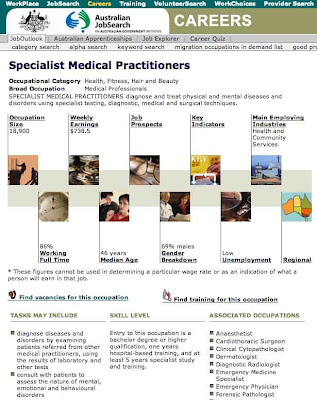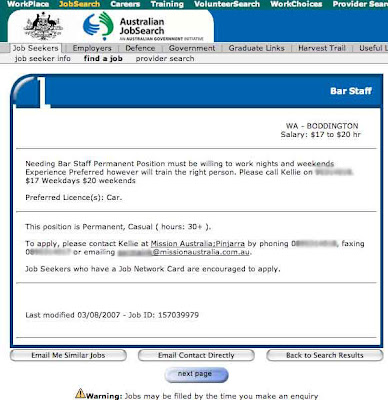Perhaps his trip to Mecca has made all the difference, perhaps it is the Federal Court giving him a Christmas Present. It doesn't matter - common sense has prevailed.
And as for the rest of you, may you all make the most of the holiday season! I will be spending my holidays on call yet again!
Haneef keen to return to Gold Coast - The SMH
(Click to Expand)
Haneef keen to return to Gold Coast
December 22, 2007 - 7:15PM
Former terrorism suspect Mohamed Haneef is keen to reapply for his position at the Gold Coast Hospital after the federal government yesterday paved the way for his return.
New Labor Immigration Minister Chris Evans said the Indian national was entitled to return to work after the full bench of the Federal Court upheld a judge's earlier decision to reinstate his work visa.
The doctor's visa was withdrawn by the former Howard government on character grounds despite terrorism charges against him being dropped.
Dr Haneef's Brisbane-based lawyer Peter Russo today informed the devout Muslim, who is currently in Mecca with his wife and mother, of Mr Evans' decision not to appeal the court's ruling.
Mr Russo said Dr Haneef was pleased with the news but had been hard to contact because he was in prayer at the annual religious pilgrimage.
"When I spoke to him yesterday it was prior to the minister making the announcement," Mr Russo told AAP.
"He is very, very happy and keen to talk to his family to resolve any outstanding issues with them and then try and get organised to come back."
The doctor has agreed to speak to Australian media from Mecca on Monday afternoon.
Mr Russo said Dr Haneef was due to return to his Indian home in Bangalore in early January when he would investigate options to return as a medico to Australia.
"He's got to get his medical registration first and if there is a position available there, I understand (the Gold Coast Hospital) is going to be his preference," Mr Russo said.
A Queensland Health spokeswoman said Dr Haneef was considered a competent young doctor by colleagues at the Gold Coast Hospital.
"If he is in a position to seek employment, Queensland Health would be happy to consider his application," the spokeswoman said.
She said he would first have to obtain a work visa from the Commonwealth and appropriate registration from the Medical Board of Queensland.
Mr Russo said his client would also try to organise a visa for his young baby daughter and wife Firdous, who continued to harbour concerns about their return following their treatment at the hands of Australian authorities.
Australian Federal Police arrested Dr Haneef at Brisbane International Airport on July 2 as he attempted to board a one-way flight to India, just days after failed UK terrorist attacks.
He was held for 12 days before finally being charged with providing support to a terrorist organisation for giving his mobile phone SIM card to his cousin Sabeel Ahmed, one of the men accused of the attempted UK bomb attacks.
The charge was dropped a fortnight later after Commonwealth Director of Public Prosecutions Damien Bugg found there was no reasonable prospect of securing a conviction against the 27-year-old.
But former immigration minister Kevin Andrews had already cancelled his visa on character grounds, meaning Dr Haneef was unable to return to work.
A full judicial inquiry will now investigate the saga.
AAP
Triumph for Haneef in terror farce - The SMH
(Click to Expand)
Triumph for Haneef in terror farce
Cosima Marriner, Tom Allard, and Amrit Dhillon in New Delhi
December 22, 2007
THE former terrorism suspect Mohamed Haneef is free to return to Australia after a court victory for the doctor yesterday, but the new Labor Government may pass laws to ensure it can reject foreigners with questionable links.
The full bench of the Federal Court dismissed the former immigration minister Kevin Andrews's appeal against a decision to reinstate the Indian doctor's visa.
The court found the law did not allow the government to revoke a visa on character grounds simply because a person had an "association", no matter how innocent, with an unsavoury individual.
But the new Immigration Minister, Chris Evans, has reserved the right to change the Migration Act if the verdict sets the bar too high to revoke a visa on character grounds. Senator Evans is also not ruling out a High Court challenge to yesterday's ruling, although he said this was unlikely.
Dr Haneef's brother, Shuaib, said that he told his brother about the verdict on the telephone from Bangalore. "He said that it was what he had been expecting all along but he was relieved that it had turned out the way he expected," Shuaib said.
Dr Haneef is on the Muslim pilgrimage to Mecca with his wife and mother-in-law. The Queensland Premier, Anna Bligh, said he would be welcome back in the state's hospital system.
Dr Haneef was working at Gold Coast Hospital before he was arrested on July 2 while trying to leave Australia on a one-way ticket to India. Mr Andrews cancelled his visa on the grounds that he failed the character test because two of his second cousins were allegedly involved in British car bomb plots, and he had been communicating with one of them, Sabeel Ahmed, just days before he tried to leave Australia.
Dr Haneef was charged with "intentionally providing [a mobile phone SIM card] to a terrorist organisation". This was dropped on July 27 after it was revealed the SIM card was in Liverpool, nowhere near Glasgow Airport, where Sabeel's brother, Kafeel, rammed a burning Jeep into a terminal.
The Federal Court's Justices Black, French and Weinberg agreed with the August finding of Justice Spender that Mr Andrews had applied "too wide" a definition of Dr Haneef's association with the Ahmed brothers. They rejected the minister's argument that it "did not require any suspicion that Dr Haneef was sympathetic to, or supportive of, or in any way involved in the criminal conduct of which the Ahmeds were suspected".
A spokesman for the Haneef family in India, Imran Siddiqui, said they had hoped for an apology from the Government.
"We were hoping that it would say it regretted what had happened to Haneef and that it would welcome him back and give him a helping hand to see what can be worked out for him in Australia," Mr Siddiqui said. He indicated the family could seek compensation. Dr Haneef has not worked since leaving Australia.
Queensland Health said Dr Haneef was considered "a competent young doctor". Ms Bligh said: "If Dr Haneef satisfied the visa requirements and the registration requirements, I would be very pleased to have him … We have a lot of pressure on our hospitals. We want to see qualified doctors working in them as soon as possible."
After reviewing the latest federal police material on Dr Haneef, Senator Evans said: "There are no grounds to take further action in relation to [his] visa." But he said: "Should any further relevant information come to light in relation to Dr Haneef, I will re-examine the situation at that time."
Senator Evans's lawyers sought to stay yesterday's ruling pending a possible High Court challenge. The court rejected the application.










